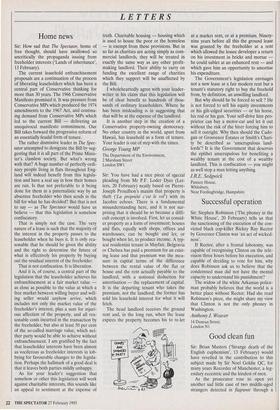LETTERS Horne news
Sir: How sad that The Spectator, home of free thought, should have swallowed so uncritically the propaganda issuing from freeholder interests (`Lands of inheritance', 13 February).
The current leasehold enfranchisement proposals are a continuation of the process of liberating leaseholders which has been a central part of Conservative thinking for more than 30 years. The 1966 Conservative Manifesto promised it. It was pressure from Conservative MPs which produced the 1974 amendments to the 1967 Act, and continu- ing demand from Conservative MPs which led to the current Bill — delivering an unequivocal manifesto commitment. Our Bill takes forward the progressive reform of an essentially feudal form of tenure.
The rather dismissive leader in The Spec- tator attempted to denigrate the Bill by sug- gesting that it is all part of the Prime Minis- ter's classless society. But what's wrong with that? A huge number of perfectly ordi- nary people living in flats throughout Eng- land will indeed benefit from this legisla- tion and have a real say in how their homes are run. Is that not preferable to it being done for them in a paternalistic way by an absentee freeholder who then sends in the bill for what he has decided? But that is not to say — as The Spectator would have us believe — that this legislation is somehow confiscatory.
That is simply not the case. The very nature of a lease is such that the majority of the interest in the property passes to the leaseholder when he buys it. It is only rea- sonable that he should be given the ability and the right to determine the future of what is effectively his property by buying out the residual interest of the freeholder.
That is not confiscation. It is liberation.
And it is, of course, a central part of the legislation that the leaseholder achieves his enfranchisement at a fair market value as close as possible to the value at which a free market between willing buyer and will- ing seller would anyhow arrive, which includes not only the market value of the freeholder's interest, plus a sum for injuri- ous affection of the property, and all rea- sonable costs incurred in the transaction by the freeholder, but also at least 50 per cent of the so-called marriage value, which nei- ther party would be able to achieve without enfranchisement. I am gratified by the fact that leaseholder interests have been almost as vociferous as freeholder interests in lob- bying for favourable changes to the legisla- tion. Perhaps the hallmark of a good deal is that it leaves both parties mildly unhappy.
As for your leader's suggestion that somehow or other this legislation will work against charitable interests, this sounds like an appeal to sentiment at the expense of truth. Charitable housing — housing which is used to house the poor or the homeless — is exempt from these provisions. But in so far as charities are acting simply as com- mercial landlords, they will be treated in exactly the same way as any other profit- making landlord. Their ability to carry on funding the excellent range of charities which they support will be unaffected by the Bill.
I wholeheartedly agree with your leader- writer in his claim that this legislation will be of clear benefit to hundreds of thou- sands of ordinary leaseholders. Where he has been misleading is in suggesting that that will be at the expense of the landlord.
It is another step in the creation of a Conservative property-owning democracy. No other country in the world, apart from Hawaii, has leasehold as a form of tenure. Your leader is out of step with the times.
George Young MP
The Department of the Environment, 2 Marsham Street London SW1


















































 Previous page
Previous page